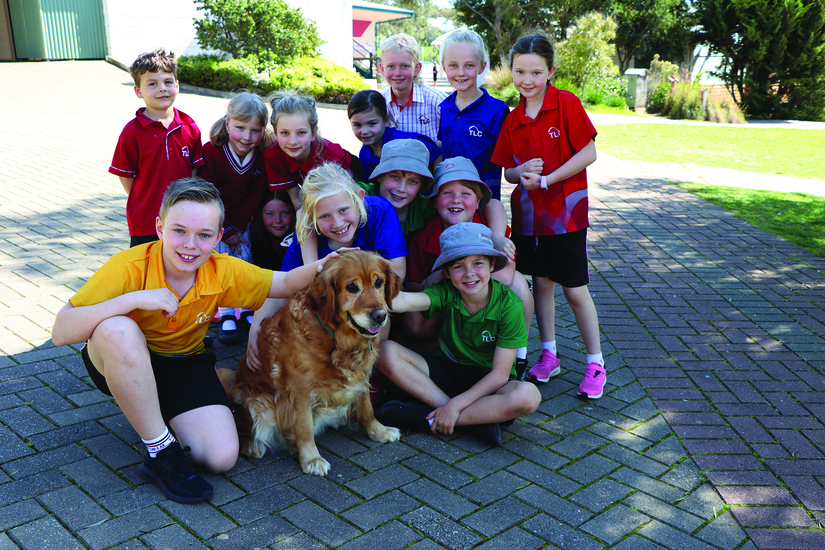13.06.2023
Relationships the key to lasting wellbeing
The emotional and psychological health of young people at school is receiving unprecedented attention in the education landscape and generating millions of dollars’ worth of investment in new facilities, staff and technology.
At Tatachilla, wellbeing is a part of our daily culture, not a single over-arching program or state-of-the-art building.
We take a grassroots approach by equipping our students with an enduring sense of belonging and community and the skills to form lifelong relationships: we believe this is the foundation for lasting wellness in life. As the adage goes, once you move the heart, you can move the head.
It is well known that flourishing children do better socially and academically. Tatachilla Lutheran College upholds student wellbeing as a core value because when a child experiences wellness in their heart and soul, they are intrinsically more motivated, determined, fulfilled and cognitively capable: in short, when you feel well, you grow and learn well.
Tatachilla supports students to develop as whole human beings, not just academic human beings, and to achieve this, our environment needs to support children to feel safe, connected, valued and have deep self-belief.
Some of the unique ways that student wellbeing is fostered at the college are described below.
3.4-hectare EcoClassroom Sanctuary
Tatachilla Lutheran College is home to a 3.4-hectare EcoClassroom Sanctuary that has been modelled on the natural ecosystems that once existed in the McLaren Vale region and which gives our students the opportunity to spend intentional time in the natural world.
The sanctuary – as well as our expansive grounds in the heart of vineyard country – have been shown to relieve anxiety, heighten feelings of calmness, restore capacity for concentration and facilitate deep joy.
The EcoClassroom Sanctuary is a contemplative space in which students, staff and families are able to actively care for the college’s resident population of endangered bettongs, potoroos and wallabies and participate in efforts to breed and release these species back into the wild.
Students are also involved in tree-planting at the sanctuary to enhance the native flora of the region and the natural habitats of our animals. This connection to nature contributes significantly to the emotional health of the students in our care.
Our EcoClassroom Sanctuary is open to the public at numerous times throughout the year for guided night walks; wellness sessions around the campfire; and workshops on growing native plants and creating artworks using botanical dyeing and lino printing.
‘Misty’ the Golden Retriever
Another example of how Tatachilla embeds wellbeing into our daily life is through our beautiful school dog, Misty. Misty is a ten-year-old Golden Retriever who has been a daily part of our college community for the past two years.
Unlike a formal service dog, Misty belongs to everyone. She roams freely on our campus to mingle with students and staff at any time of the day, inside and outside the classroom, and at both school drop-off and pick-up times.
This fosters spontaneous encounters of affection and helps our students relax, communicate, express their emotions and feel safe. It also draws out a lot of love and care among our children. In this way, Misty is a crucial touchpoint between students, parents and staff.
She attends on-site counselling sessions with students (and parents) who need emotional support and also comes to staff briefings, devotions, assemblies and chapel services. Anyone is free to pat or hug Misty throughout the school day.
Importantly, staff have observed that Misty has a sixth sense about students who may be troubled and has an uncanny ability to seek out the child who is hurt or sad and give that child unsolicited love and attention. Our junior school students are particularly cautious about not leaving unhealthy food scraps in any communal areas because they know that they may harm Misty if she ingests them. Misty is a wellspring of joy and love at our college and beloved by all students and staff.
“Eight Mates” initiative
A further example of how Tatachilla fosters deep connection and trust between our students is an initiative called “Eight Mates”.
Eight of our Year 8 boys are partnered with a small group of Year 4 boys to undertake a series of age-appropriate ‘survivor-style’ challenge activities. The Year 8 boys are trained in mentorship beforehand.
The boys meet once a week for 45-minutes for an entire term.
The Year 8 boys come to see themselves as important role models with the ability to positively influence others and play a meaningful role in the college community. The Year 4 boys gain confidence and forge bonds of mateship with their older peers.
At the end of the term the Year 8 boys reflect on their experience and how they have grown as individuals. Given that the research tells us that young boys often have fewer tools to manage emotions and stress, “Eight Mates” is an important part of Tatachilla’s commitment to fostering kinship, positive behaviour, resilience and self-awareness among our male students.
Training in trauma-informed practice
All teaching and support staff at Tatachilla receive ongoing professional development in the field of student wellbeing, and will shortly commence professional training in trauma-informed practice.
This will assist them to create environments and routines that are sensitive to children who have experienced trauma and support these children to regulate their emotions, restore personal wellness and adopt healthy behaviours.




